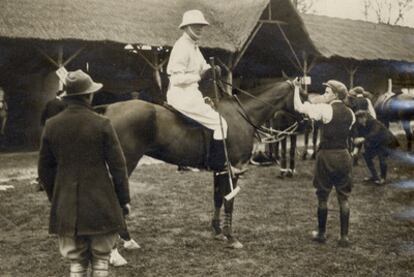Churchill's finest hours
A Madrid exhibition examines the British wartime PM's links with Spain
"Prime minister" was the profession he wrote in the appropriate space on his passport. And, of course, that was Winston Churchill's occupation from 1940 to 1945, and 1951 to 1955. But over the course of his life he could also have listed himself as soldier, military hero, war reporter, biographer, historian, political thinker or Nobel Literature Laureate. All these faces of this key figure 20th-century figure are present in the exhibition Caminando con el destino. Winston Churchill y España: 1874-1965 (or, Walking with destiny: Winston Churchill and Spain, 1874-1965), on show at Madrid's El Águila exhibition hall.
David Sarias, professor of history at the King Juan Carlos University and the show's curator, has reconstructed a biographical account of his life via documents, objects - such as the aforementioned passport and his characteristic top hat and walking stick - and original photographs from the Churchill Archives Centre in Cambridge, England, the Chartwell House museum and Toledo's Army Museum. "The core of the exhibition is the original documents," says Sarias.
There are also the famous speeches that have established Churchill as one of history's greatest orators, including the "Never was so much owed by so many to so few" address that he made in August 1940 to encourage the RAF pilots fighting the Luftwaffe in the ongoing Battle of Britain, as well as the one he made in 1946 at the University of Zurich, in which he argued the case in favor of European integration.
"I am often asked who wrote his speeches for him, and the answer is that he wrote them himself," said his great grandson Jack Churchill last week. "He devoted an hour to every minute, which is why they are so good. He preferred to assign his time and energy to writing exactly what he wanted to say. During the war he moved language in the direction of action, and he did so through words. I think it is important that people understand that words can go very far, and, if used in the right way, can have a positive impact."
The exhibition lays special emphasis on Churchill's relationship with Spain. It's a link that began in 1895 when he traveled to Cuba to observe the Spanish army fighting the guerillas during the Cuban War of Independence. It continued in later decades along the political tightropes of the Spanish Civil War and World War II. "Churchill maintained an affectionate personal relationship with Alfonso XIII and Jacobo Fitz-James Stuart, Duke of Alba, which is reflected in the letters that form part of the exhibition. And even though there isn't much to reveal with regard to what are known as his policies of non-intervention, we have aimed to put it in context with the documents," says Sarias.
Even though he wasn't prime minister at the time of the Spanish Civil War, Churchill was of the opinion that he had to opt for the lesser evil with regard to the conflict. "Trusting that communism wasn't taking hold in Spain, and that in the process, [Franco] was the one walking toward being in absolute control of the old kingdom of Alfonso XIII, he was shown to be more reasonable than his counterparts in Berlin and Rome," explains the exhibition catalogue.
During World War II, with Franco in power, the obsession of the by-then prime minister was that Spain wouldn't fully enter on the German side, that it wouldn't interfere in the Allied landings in North Africa and that it would interrupt the supply of tungsten to the Nazi troops.
The Spanish dictator knew the rules of the game that would allow him to stay in power. A curious photograph in the show reveals a peculiar type of diplomacy on the part of the regime: a picture of the head of a bull with a letter "V" marked on its forehead, which famed bullfighter Manolete gave to Churchill. The matador had killed the bull in Valencia on May 8, 1945, the day of the Allied victory in Europe.
Caminando con el destino. Winston Churchill y España: 1874-1965. Until June 5 at El Águila, C/ Ramírez de Prado 3, Madrid. www.madrid.org








































